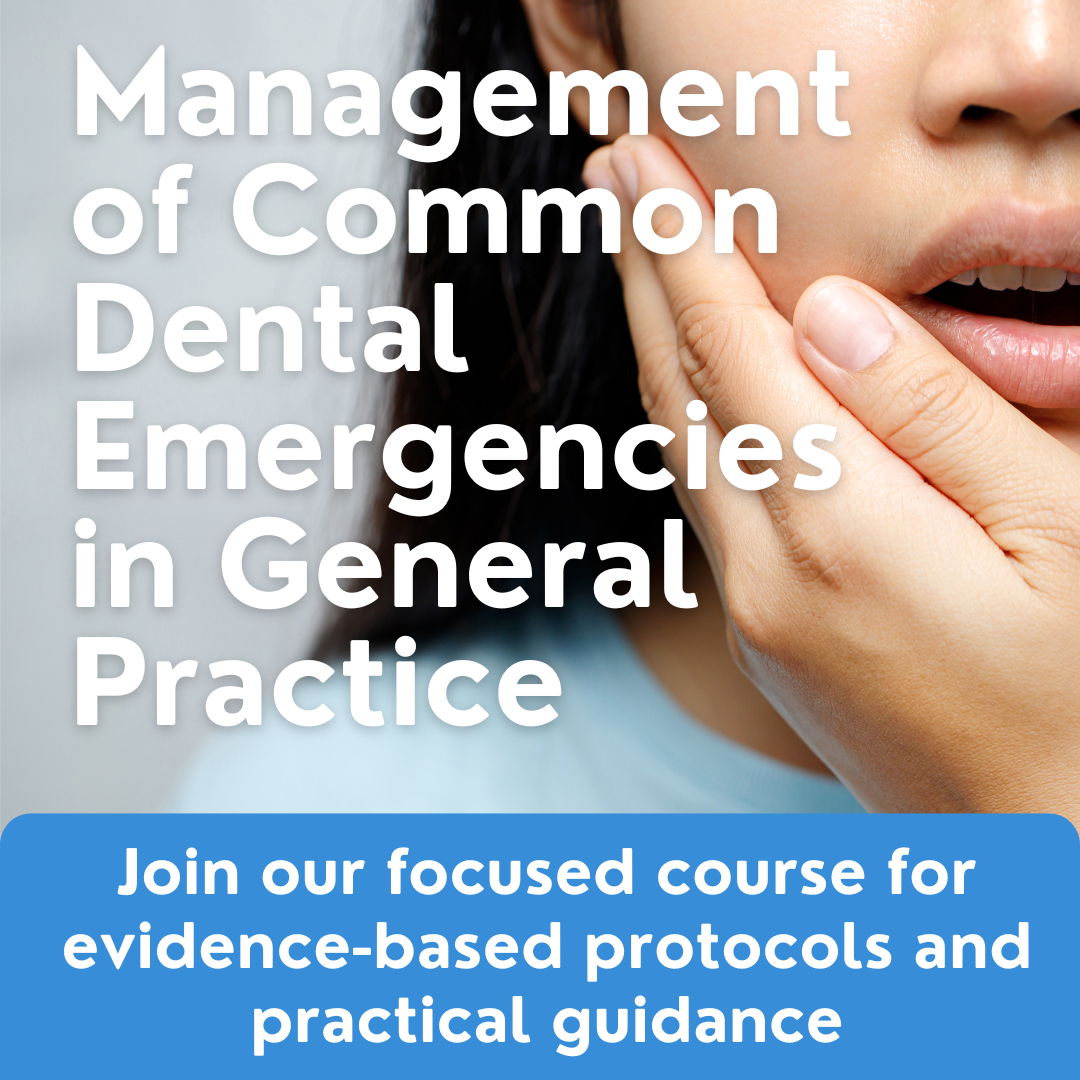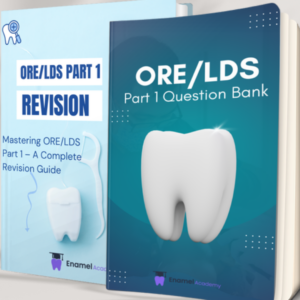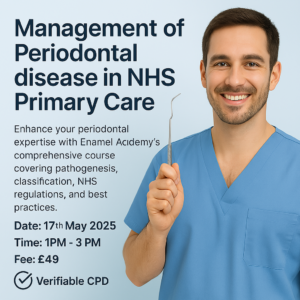Date:
26th January 2025
Duration:
Time:
10AM-1PM
CPD:
3 hours(Verfiable)
Course Fee : £57
Duration: Time: 10AM-1PM CPD: 3 hours(Verfiable)
Course Fee : £57
Course Overview:
This course is designed to equip General Dental Practitioners (GDPs) with the knowledge and confidence needed to effectively diagnose and manage common dental emergencies in a primary care setting. The course will cover urgent conditions such as dental trauma, acute infections, and non-traumatic emergencies. Participants will learn evidence-based protocols for immediate care and stabilization of patients.
Learning Objectives:
By the end of this course, participants will be able to:
- Accurately diagnose and differentiate between various dental emergencies.
- Implement appropriate management strategies tailored to different emergency conditions.
- Identify when referral or secondary care is necessary.
- Communicate emergency treatment options effectively to patients, ensuring informed consent and management of expectations.
Course Format:
- Duration: 3 hours
- Structure: Lecture-based sessions with interactive discussions and case-based learning.
Course Breakdown:
Session 1: Introduction to Dental Emergencies
Definition and Classification of Dental Emergencies:
- Overview of urgent vs. non-urgent dental conditions.
- Classification of dental emergencies: trauma, infections, post-operative complications, and non-dental sources (e.g., orofacial pain).
- Overview of dental triage: How to assess and prioritize patients based on severity and symptoms.
Initial Assessment and Triage:
- Conducting a systematic evaluation using medical history and clinical examination.
- Importance of quick and accurate documentation in emergency situations.
- Criteria for determining the need for immediate vs. delayed intervention.
Legal and Ethical Considerations:
- Discuss GDC standards and NHS guidelines for managing dental emergencies.
- Understanding consent and record-keeping requirements specific to emergency care.
Session 2: Management of Dental Trauma
Management of Soft Tissue Injuries:
- Recognition and classification of lacerations, abrasions, and contusions.
- Principles of managing soft tissue trauma and the role of referral.
Management of Hard Tissue Trauma:
- Diagnosis and immediate management of crown fractures (uncomplicated and complicated), root fractures, and alveolar bone fractures.
- Discuss the protocols for stabilizing injured teeth and determining prognosis.
Management of Luxation Injuries:
- Repositioning and stabilization techniques for luxation injuries (e.g., subluxation, lateral luxation, extrusion).
- Guidelines for splinting duration and follow-up care (based on IADT guidelines).
Avulsion Management:
- Emergency management of avulsed permanent teeth, including reimplantation protocols.
- Discuss the use of appropriate storage media and patient instructions for avulsed teeth.
- Contraindications for reimplantation and considerations for primary teeth.
Case-Based Learning:
- Discuss case examples of common traumatic injuries encountered in general practice.
- Participants will analyze the cases, discuss potential management strategies, and review evidence-based outcomes.
Session 3: Management of Acute Dental Infections
Acute Periapical and Periodontal Abscesses:
- Differentiating between periapical and periodontal abscesses.
- Step-by-step management, including drainage, debridement, and use of appropriate pharmacological agents.
- Indications for systemic antibiotics and pain management.
Management of Facial Swelling:
- Diagnosing and managing cellulitis and space infections.
- Referral guidelines for severe or rapidly spreading infections (e.g., Ludwig’s angina).
- Discuss NICE guidelines on the use of antibiotics in dental infections.
Pericoronitis:
- Etiology and management of acute pericoronitis.
- Role of irrigation, antibiotics, and patient education.
- Discuss when surgical intervention is indicated and referral protocols.
Management of Necrotizing Periodontal Diseases:
- Recognition and management of necrotizing gingivitis and periodontitis.
- Use of topical antimicrobials, systemic antibiotics, and pain management strategies.
Case-Based Learning:
- Present case scenarios highlighting the management of acute dental infections.
- Discuss decision-making strategies and referral criteria.
Session 4: Non-Traumatic Dental Emergencies
Acute Pulpitis and Reversible vs. Irreversible Pulpitis:
- Diagnostic criteria for differentiating reversible and irreversible pulpitis.
- Immediate management options in a general practice setting.
- Discuss when to consider endodontic intervention or extraction.
Cracked Tooth Syndrome:
- Diagnosis and management of cracked teeth using clinical and radiographic tools.
- Discuss immediate palliative treatment options and long-term restorative considerations.
Acute Temporomandibular Joint (TMJ) Pain and Dysfunction:
- Causes of acute TMJ pain and identifying non-dental sources of orofacial pain.
- Management strategies, including pharmacological options and referral pathways.
- Emergency management of TMJ dislocation and considerations for follow-up care.
Acute Post-Operative Complications:
- Managing post-extraction bleeding, dry socket (alveolar osteitis), and post-operative infections.
- Guidelines for managing complications and providing post-operative instructions to patients.
Case-Based Learning:
- Discuss complex non-traumatic emergency cases, highlighting differential diagnoses and treatment planning.
- Engage participants in identifying best management practices.
Session 5: Communication and Patient Management
Effective Communication in Emergency Situations:
- Techniques for conveying diagnosis and treatment options to patients during emergencies.
- Discuss managing patient expectations and handling consent for emergency procedures.
Patient Education and Compliance:
- Educating patients on emergency management protocols, follow-up care, and preventive strategies.
- Discuss the role of written instructions and emergency follow-up documentation.
Dealing with Challenging Situations:
- Managing anxious or distressed patients in emergency situations.
- Discuss strategies for defusing difficult interactions and ensuring patient cooperation.
Session 6: Q&A and Summary of Key Takeaways
Open Q&A Session:
- Address participant questions related to emergency management scenarios they’ve encountered in their practice.
- Provide additional resources for continued learning and professional development.
Summary of Core Concepts:
- Review of key points covered in the course.
- Emphasis on best practices and evidence-based management strategies.
Course Materials:
- Emergency management protocol handouts.
- Recommended pharmacological agents and dosage guidelines.
- Reference list of clinical guidelines (IADT, NICE, FGDP) for further reading.
This structured course will provide GDPs with a solid foundation in managing common dental emergencies confidently and effectively, enhancing patient outcomes and practice efficiency.






Reviews
There are no reviews yet.